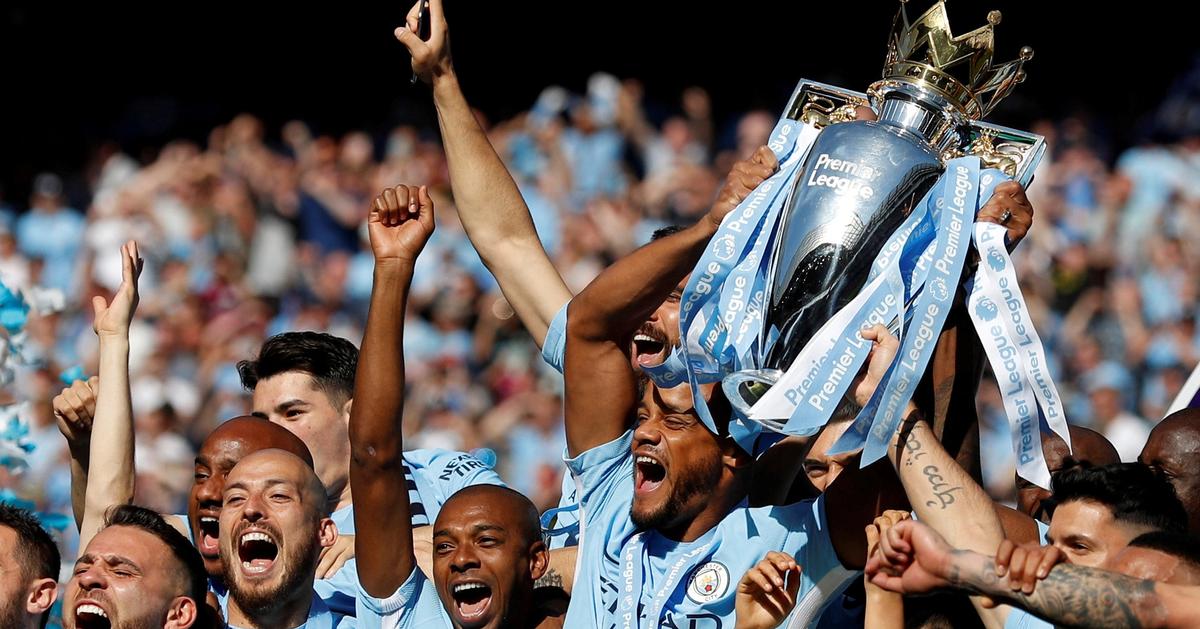REUTERS/Phil Noble
Manchester City had won the Premier League by Christmas.
Of course, it wouldn't be until Manchester United lost to West Bromwich Albion in April that the title was finally transferred from Chelsea but at the season's midpoint - with Pep Guardiola's side already 13 points clear of their cross-city rivals - there was already very little doubt the way in which things were headed.
In the last couple of weeks, records have been tumbling for the Premier League Champions: the most goals in a Premier League season, the most wins in a Premier League season, the most points in a Premier League season, the most away wins in a Premier League season - the litany is almost unending.
Table of Contents
Why, then, have so many been left numb by this season?
A caveat
At this point: a caveat.
Anyone who has been left cold by the way that Manchester City have played the game over the course of the last nine months would probably fail a Turing Test.
There is something metaphysical about the way that the Manchester-based outfit play that makes you think that they might have found the cheat code for football.
This should hardly be surprising given that at almost every point of his career Pep Guardiola has left football fans wondering whether or not he has moved the beautiful game to its final evolutionary cycle.
REUTERS/Phil Noble
Remember tiki-taka? At the time, many of us were left wondering if there could ever be a response to this mesmerising style of play that could stymie it.
Of course, history showed that there was. But, once again, the Catalan manager wasn't held back.
The Manchester City side play a new brand of football. And it is hard not to admire. Inverted fullbacks, free eights, a 4-3-3 which made use of wide forwards when injury made the 3-5-2 unavailable: this is creativity and necessity melded together into a scintillating melange of implicit talent and imparted knowledge.
The big 'But'
But... as an extended spectacular, this Premier League season has left a lot of people numb.
With the title challenge wrapped up early, the Champions League qualification flirting with the idea of running deep into the season before everyone involved capitulated, even the relegation battle petering out despite promising so much in the weeks before the season end.
Now it would be unfair to throw the majority of the blame at the feet of Manchester City. After all, last season - a season which saw Chelsea canter to the championship title - was hardly a rambunctious affair.
REUTERS/Michael Dalder
But there is a very real sense in which the slow atrophy of anything like competitiveness from a league results in an equal and opposite slow apathy in which the fans slowly cease to care.
Compare, for example, the Bundesliga. Despite Borussia Dortmund flying out of the traps, the inevitable ended up happening and Bayern ended up winning by 21 points.
At the end of the season, freelance journalist Lars Pollman wrote: "Thank fuck this season is over."
To be the best
One of the implicit logics of a capitalist society is the logic of continuous growth. To sustain an economic system, you need to grow this system constantly.
Given that football has become a vehicle for capital in recent decades, the implicit logics of capitalism have bled through into the minds of club personnel and fans alike: continuous improvement is the goal.
Reuters/Carl Recine
As to how this constant improvement is achieved, the easiest metric to go by is the football itself: the better the statistics, the better the improvement.
By this reasoning, Manchester City, as the best Premier League of all time - at least by most metrics - should be the capitalist dream.
"Here is the pinnacle of what the Premier League has to offer you! Enjoy our product!"
The object of desire
And yet there is another facet to capitalism: the product has to be desirable.
It turns out uncompetitive leagues aren't quite so desirable regardless of the quality of the team who wins.
Which leaves the Premier League with a conundrum: should they wait for the other teams in the league to catch up to Manchester City's level and risk losing their audience? Or should they do something to reinvigorate competitiveness in the league?
How this could be done remains up for debate. Financial Fair Play has clearly failed. And with news of a potential Club World Cup being posited by FIFA, it may already be too late to save the Premier League.
As football continues to function as the battleground for capitalism, then an undesirable product will quickly be replaced.
Unless the Premier League does level the playing field somewhat, though, it could soon fade into insignificance.
Explore new topics and discover content that's right for you!
News



